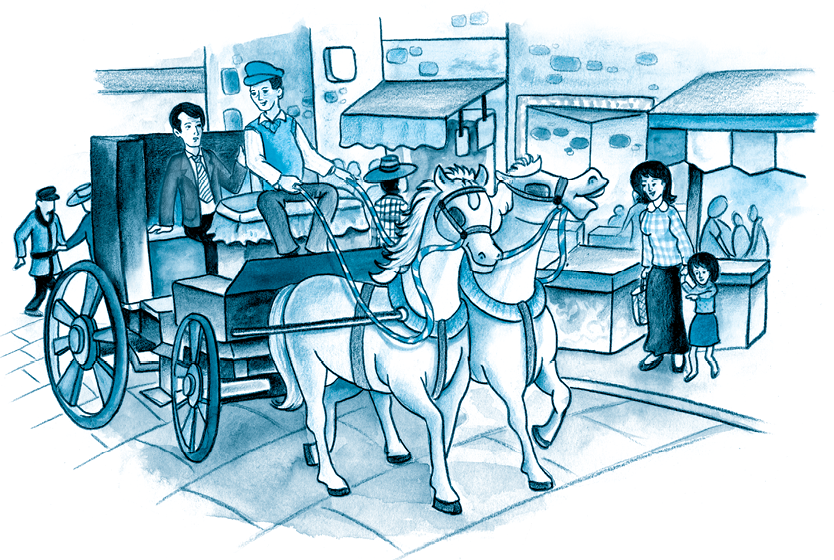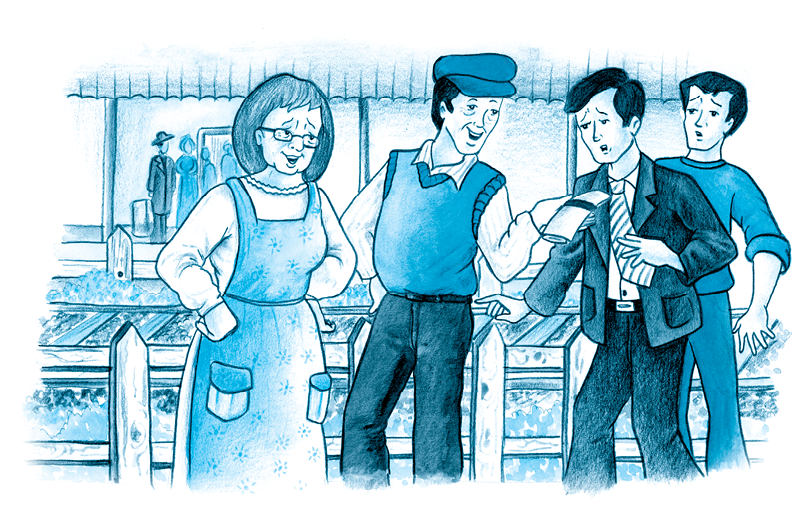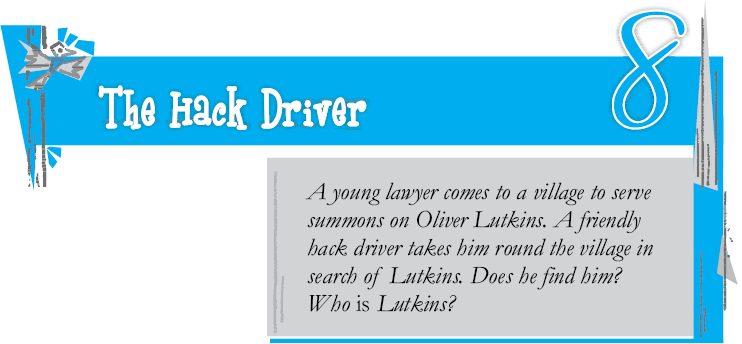Table of Contents
Read and Find Out
• Why is the lawyer sent to New Mullion? What does
he first think about the place?
• Who befriends him? Where does he take him?
• What does he say about Lutkins?
After graduating with honours, I became a junior assistant clerk in a magnificent law firm. I was sent, not to prepare legal briefs, but to serve summons, like a cheap private detective. I had to go to dirty and shadowy corners of the city to seek out my victims. Some of the larger and more self-confident ones even beat me up. I hated this unpleasant work, and the side of city life it revealed to me. I even considered fleeing to my hometown, where I could have been a real lawyer right away, without going through this unpleasant training period.
So I rejoiced one day when they sent me out forty miles in the country, to a town called New Mullion, to serve summons on a man called Oliver Lutkins. We needed this man as a witness in a law case, and he had ignored all our letters.
When I got to New Mullion, my eager expectations of a sweet and simple country village were severely disappointed. Its streets were rivers of mud, with rows of wooden shops, either painted a sour brown, or bare of any paint at all. The only agreeable sight about the place was the delivery man at the station. He was about forty, red-faced, cheerful, and thick about the middle. His working clothes were dirty and well-worn, and he had a friendly manner. You felt at once that he liked people.
“I want,” I told him, “to find a man named Oliver Lutkins.”
“Lutkins? I saw him around here about an hour ago. Hard fellow to catch though — always up to something or other. He’s probably trying to start up a poker game in the back of Fritz’s shop. I’ll tell you, boy — is there any hurry about locating Lutkins?”
“Yes. I want to catch the afternoon train back to the city.” I was very important and secret about it.
“I’ll tell you what. I’ve got a hack. I’ll get it out and we can drive around together and find Lutkins. I know most of the places he hangs out.”
He was so open and friendly that I glowed with the warmth of his affection. I knew, of course, that he wanted the business, but his kindness was real. I was glad the fare money would go to this good fellow. I managed to bargain down to two dollars an hour, and then he brought from his house nearby a sort of large black box on wheels. He remarked, “Well, young man, here’s the carriage,” and his wide smile made me into an old friend. These villagers are so ready to help a stranger. He had already made it his own task to find Oliver Lutkins for me.

He said, “I don’t want to interfere, young fellow, but my guess is that you want to collect some money from Lutkins. He never pays anybody a cent. He still owes me fifty cents on a poker game I was fool enough to play with him. He’s not really bad, but it’s hard to make him part with his money. If you try to collect from him, in those fancy clothes, he’ll be suspicious and get away from you. If you want I’ll go into Fritz’s and ask for him, and you can keep out of sight behind me.”
I loved him for this. By myself, I might never have found Lutkins. With the hack driver’s knowing help, I was sure of getting my man. I took him into my confidence and told him that I wanted to serve the summons on Lutkins — that the man had refused to be a witness, when his information would have quickly settled our case. The driver listened earnestly. At the end, he hit me on the shoulder and laughed, “Well, we’ll give Brother Lutkins a little surprise.”
“Let’s start, driver.”
“Most folks around here call me Bill or Magnuson. My business is called ‘William Magnuson Fancy Carting and Hacking’.”
“All right, Bill. Shall we proceed to Fritz’s”.
“Yes, Lutkins is just as likely to be there as anywhere. Plays a lot of poker. He’s good at deceiving people.” Bill seemed to admire Lutkins’ talent for dishonesty. I felt that if he had been a policeman, he would have caught Lutkins respectfully, and jailed him with regret.
Bill led me into Fritz’s. “Have you seen Oliver Lutkins around today? Friend of his looking for him,” said Bill cheerily.
Fritz looked at me, hiding behind Bill. He hesitated, and then admitted, “Yes, he was in here a little while ago. Guess he’s gone over to Gustaff’s to get a shave.”
“Well, if he comes in, tell him I’m looking for him.”
We drove to Gustaff’s barber shop. Again Bill went in first, and I lingered at the door. He asked not only the Swede but two customers if they had seen Lutkins. The Swede had not. He said angrily, “I haven’t seen him, and don’t care to. But if you find him you can just collect that dollar thirty-five he owes me.” One of the customers thought he had seen Lutkins walking down Main Street, this side of the hotel.
As we climbed back into the hack, Bill concluded that since Lutkins had exhausted his credit at Gustaff’s he had probably gone to Gray’s for a shave. At Gray’s barber shop we missed Lutkins by only five minutes. He had just left — probably for the poolroom. At the poolroom it appeared that he had just bought a pack of cigarettes and gone out. So we pursued him, just behind him but never catching him, for an hour till it was past one o’clock. I was hungry. But I had so enjoyed Bill’s rough country opinions about his neighbours that I scarcely cared whether I found Lutkins or not.
“How about something to eat?” I suggested. “Let’s go to a restaurant and I’ll buy you lunch.”
“Well, I ought to go home to the wife. I don’t care much for these restaurants — only four of them and they’re all bad. Tell you what we’ll do. We’ll get the wife to pack up a lunch for us — she won’t charge you more than half a dollar, and it would cost you more for a greasy meal in a restaurant — and we’ll go up to Wade’s Hill and enjoy the view while we eat.”
Read and Find Out
• What more does Bill say about Lutkins and his family?
• Does the narrator serve the summons that day?
• Who is Lutkins?
I know that Bill’s helpfulness to the Young Fellow from the City was not entirely a matter of brotherly love. I was paying him for his time; in the end I paid him for six hours (including the lunch hour) at what was then a very high price. But he was no more dishonest than I. I charged the whole thing to the firm. But it would have been worth paying him myself to have his presence. His cheerful country wisdom was very refreshing to a country boy like myself who was sick of the city. As we sat on the hilltop, looking over the pastures and creek which slipped among the trees, he talked of New Mullion, and painted a picture in words of all the people in it. He noticed everything, but no matter how much he might laugh at people, he also understood and forgave their foolishness. He described the minister’s wife who sang the loudest in church when she was most in debt. He commented on the boys who came back from college in fancy clothes. He told about the lawyer whose wife could never succeed in getting him to put on both a collar and a tie on the same day. He made them all live. On that day I came to know New Mullion better than I did the city, and to love it better.
Bill didn’t know about colleges and cities, but he had travelled around a lot of the country, and had had a lot of jobs. From his adventures he had brought back a philosophy of simplicity and laugher. He strengthened me.
We left that peaceful scene of meadows and woods, and resumed our search of Oliver Lutkins. We could not find him. At last Bill cornered a friend of Lutkins and made him admit what he guessed, “Oliver’s gone out to his mother’s farm, three miles north.”
We drove out there, laying plans.
“I know Oliver’s mother. She’s a terror,” Bill sighed. “I took a trunk out there for her once, and she almost took my skin off because I didn’t treat it like a box of eggs. She’s about nine feet tall and four feet thick and quick as a cat, and she sure can talk. I’ll bet Oliver heard that somebody’s chasing him, and he’s gone on there to hide behind his mother’s skirts. Well, we’ll try her. But you’d better let me do it, boy. You may be great at literature and law, but you haven’t had real training in swearing.”
We drove into a poor farmyard; we were faced by an enormous and cheerful old woman. My guide bravely went up to her and said, “Remember me? I’m Bill Magnuson, the carter and hackman. I want to find your son, Oliver.”
“I don’t know anything about Oliver, and I don’t want to,”
she shouted.
“Now, look here. We’ve had just about enough nonsense. This young man represents the court in the city, and we have a legal right to search all properties for this Oliver Lutkins.”
Bill made me sound very important, and the woman was impressed. She retired into the kitchen and we followed. She seized an iron from the old-fashioned stove and marched on us shouting. “You search all you want to — if you don’t mind getting burnt first.” She shouted and laughed at our frightened retreat.
“Let’s get out of here. She’ll murder us,” Bill whispered. Outside, he said, “Did you see her smile? She was laughing at us.”
I agreed that it was pretty disrespectful treatment. We did, however, search the house. Since it was only one storey high, Bill went round it, peering in at all the windows. We examined the barn and stable; we were reasonably certain that Lutkins was not there. It was nearly time for me to catch the afternoon train, and Bill drove me to the station.
On the way to the city I worried very little over my failure to find Lutkins. I was too busy thinking about Bill Magnuson. Really, I considered returning to New Mullion to practise law. If I had found Bill so deep and richly human, might I not grow to love Fritz and Gustaff and a hundred other slow-spoken, simple, wise neighbours? I pictured an honest and happy life beyond the strict limits of universities and law firms. I was excited. I had found a treasure. I had discovered a new way of life.
But if I did not think much about Lutkins, the office did. I found them all upset. Next morning the case was coming up in the court, and they had to have Lutkins. I was a shameful, useless fool. That morning my promising legal career almost came to an end before it had begun.
The Chief almost murdered me. He hinted that I might do well at digging ditches. I was ordered back to New Mullion, and with me went a man who had worked with Lutkins. I was rather sorry, because it would prevent my loafing all over again with Bill.
When the train arrived at New Mullion, Bill was on the station platform, near his cart. Strangely enough, that old tigress, Lutkins’ mother was there talking and laughing with Bill, not quarrelling at all.
From the train steps I pointed Bill out to my companion and said, “There’s a fine fellow, a real man. I spent the day with him.”

“He helped you hunt for Oliver Lutkins?”
“Yes, he helped me a lot.”
“He must have; he’s Lutkins himself.”
What really hurt me was that when I served the summons, Lutkins and his mother laughed at me as though I were a bright boy of seven. With loving kindness they begged me to go with them to a neighbour’s house for a cup of coffee.
“I told them about you and they’re anxious to look at you,” said Lutkins joyfully. “They’re about the only folks in the town that missed seeing you yesterday.”
Sinclair Lewis
Glossary
hack: a horse-drawn vehicle
agreeable sight: pleasant sight
poker: a card game in which bluff is used as players bet on the value of their cards
earnestly: very seriously
creek: short arm of river; inlet on sea-coast

1. When the lawyer reached New Mullion, did ‘Bill’ know that he was looking for Lutkins? When do you think Bill came up with his plan for fooling the lawyer?
2. Lutkins openly takes the lawyer all over the village. How is it that no one lets out the secret? (Hint: Notice that the hack driver asks the lawyer to keep out of sight behind him when they go into Fritz’s.) Can you find other such subtle ways in which Lutkins manipulates the tour?
3. Why do you think Lutkins’ neighbours were anxious to meet the lawyer?
4. After his first day’s experience with the hack driver the lawyer thinks of returning to New Mullion to practise law. Do you think he would have reconsidered this idea after his second visit?
5. Do you think the lawyer was gullible? How could he have avoided being taken for a ride?

1. Do we come across persons like Lutkins only in fiction or do we encounter them in real life as well? You can give examples from fiction, or narrate an incident that you have read in the newspaper, or an incident from real life.
2. Who is a ‘con man’, or a confidence trickster?

• ‘The Questionable Cargo’ by Captain W. E. Johns
• ‘My Last Dollar’ by Stephen Leacock
• ‘Barin Bhowmik’s Ailment’ by Satyajit Ray

